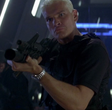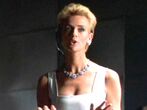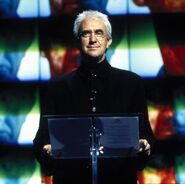Tag: sourceedit |
Tag: rte-wysiwyg |
||
| Line 49: | Line 49: | ||
It also appears that Carver has a rather unique affinity for television screens since all of his bases are saturated with unusually grand quantities of video screens, some large enough to cover several meters-high walls. |
It also appears that Carver has a rather unique affinity for television screens since all of his bases are saturated with unusually grand quantities of video screens, some large enough to cover several meters-high walls. |
||
| − | Carver poses no real physical threat however, possessing a rather wiry frame typical of a man his age, coupled with a thinning head of neatly trimmed grey hair. In traditional Bond Villain fashion, Carver wears a series of identical black Nehru suit jackets which he occasionally wears over a black mock-neck |
+ | Carver poses no real physical threat however, possessing a rather wiry frame typical of a man his age, coupled with a thinning head of neatly trimmed grey hair. In traditional Bond Villain fashion, Carver wears a series of identical, black Nehru suit jackets which he occasionally wears over a black mock-neck shirt and black dress slacks. His most distinguishing feature is perhaps, his reflective steel rimmed glasses with which he is never seen without. |
==Henchmen== |
==Henchmen== |
||
Revision as of 20:06, 19 April 2015
- "I may have some breaking news for you, Elliot. You forgot the first rule of mass media, Elliot: Give the people what they want!"
- ― James Bond to Elliot Carver
Elliot Carver is a British media baron and the main villain in the 1997 James Bond film Tomorrow Never Dies. He is played by Jonathan Pryce.
Film biography
Carver planned to provoke war between China and the United Kingdom, which would lead to the replacement of the current Chinese government with one more supportive to Carver's plans of exclusive broadcast rights.
To do this, he sent American "techno-terrorist" Henry Gupta to purchase a GPS encoder (made by the American military) from a terrorist arms bazaar. Meaconing the GPS signal using the encoder, Gupta sends the British frigate HMS Devonshire off-course into Chinese-held waters in the South China Sea, where Carver's undetectable stealth ship, commanded by Mr. Stamper, sinks the frigate with a sea drill and steals one of its missiles. Afterwards, Stamper's men shoot down a Chinese J-7 fighter jet sent to investigate the British presence, and kill the Devonshire's survivors with Chinese weaponry.
M sends Bond to investigate Carver after Carver Media releases news with critical details hours before these have become known, and MI6 noticed a spurious signal from one of his CMGN communications satellites when the frigate was sunk. Bond travels to Hamburg and seduces Carver's wife, Paris, an ex-girlfriend, to get information that would help him enter Carver's newspaper headquarters. After Bond steals back the GPS encoder, Carver orders the deaths of Paris and Bond. Paris is killed by Dr. Kaufman, but Bond kills Kaufman and escapes.
Investigating the Devonshire wreck in the South China Sea, Bond and Wai Lin, a Chinese spy on the same case, are captured by Stamper and taken to the CMGN tower in Saigon. Meeting with them, Carver reveals his plans to the pair and prepares to have them tortured. However, they manage to escape and subsequently collaborate on the investigation.
They find Carver's stealth ship in Ha Long Bay and board it to prevent him firing the stolen British cruise missile at Beijing. During the battle, Wai Lin is captured, but Bond manages to escape by using one of Carver's henchmen to fake his death. On the ship's bridge, Bond captures Gupta to use as his own hostage, but Carver kills Gupta, claiming he has "outlived his contract". Although now cornered, Bond detonates an explosive, damaging the ship and making it visible to radar, and vulnerable to a subsequent Royal Navy attack. Carver eventually finds Bond and holds him at gunpoint, explaining to him that by destroying his stealth ship, he is also destroying any evidence of Carver's actions. Bond secretly activates the sea drill Carver used to sink the HMS Devonshire, and while Carver is distracted, Bond grapples with him and disarms him. He then holds a screaming Carver in front of the approaching drill, informing him that he forgot that the first rule of mass media is to give the people what they want, and releases him at the last possible second, allowing the drill to shred him to pieces while Bond escapes.
Novelization
Raymond Benson's novelization to the film adds more background to Carver's pre-film biography. The film itself mentioned that he previously worked for a newspaper in Hong Kong, but the novel reveals that he was the illigitimate son of the British newspaper baron Lord Roverman and a German prostitute. His mother died in child-birth and his father paid a Hong Kong family to take him in. His foster father revealed on his death bed who Carver's father really was. Carver went on to become a TV anchor in Hong Kong until he went to England to notify his father that he knew who he was, and his father tried to bribe him into never coming back. Carver then met Stamper and had him follow his father, and Stamper discovered that Lord Roverman was having an affair with an American prostitute and that he enjoyed dressing up in a Catholic school-girl's uniform while she spanked him. Carver tortured his father with this information until Lord Roverman re-wrote his will to make Carver his sole heir. Roverman then went back to America to find that Stamper had already murdered his mistress. Stamper then gave Roverman a gun and pressured him to commit suicide which he subsequently did. Roverman's wife and daughter tried to contest his will as they did not even know of Carver's existence, but Carver won in court and inherited his father's fortune.
Personality & Appearance
Personality-wise, Carver is manipulative and vengeful, remorselessly murdering anyone he deems useless or a traitor. Carver is also vain and highly narcissistic, going so far as to decorate his headquarters and other places pertaining to his media empire, with tapestries and oversized banners that bear his visage.
It also appears that Carver has a rather unique affinity for television screens since all of his bases are saturated with unusually grand quantities of video screens, some large enough to cover several meters-high walls.
Carver poses no real physical threat however, possessing a rather wiry frame typical of a man his age, coupled with a thinning head of neatly trimmed grey hair. In traditional Bond Villain fashion, Carver wears a series of identical, black Nehru suit jackets which he occasionally wears over a black mock-neck shirt and black dress slacks. His most distinguishing feature is perhaps, his reflective steel rimmed glasses with which he is never seen without.
Henchmen
Behind the scenes
Carver is unique in the fact that he is probably the first main Bond villain that the audience know who was positively married. Previous Bond foes appeared to be single, and never even a hint of divorce or widowhood. He is the third villain to attempt to start a World War, the first being Ernst Stavro Blofeld and the second being Karl Stromberg.
Carver is based largely on two real-life media moguls, Rupert Murdoch, who owns News Corporation, and Microsoft founder Bill Gates. A clever jab at Gates and Microsoft is made early in the film, when Carver inquires about his new computer software:
- Tech: As requested, it's full of bugs, meaning people will be forced to upgrade for years.
- Carver: Outstanding.
He is also based, in part, on deceased British media magnate Robert Maxwell, who died in mysterious circumstances on his luxury yacht and who is believed to have committed suicide (though some believe he may have been assassinated). In the movie, M's cover story for Carver's death is strikingly similar. Carver, in announcing his hypocritical 'Declaration of Principles' on the abortive inaugural broadcast of his news network, is also reminiscent of fictional newspaper tycoon Charles Foster Kane, who in turn was based on real tycoon William Randolph Hearst, whom Carver paraphrases to Bond on his stealth ship.
Gallery







